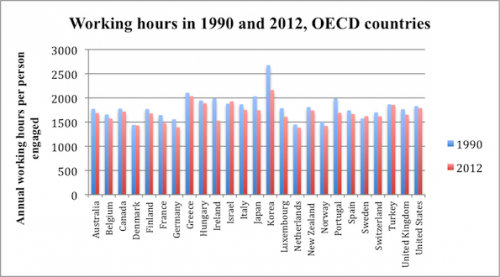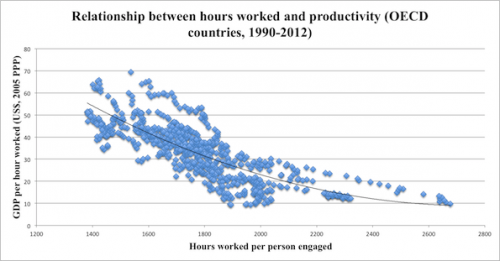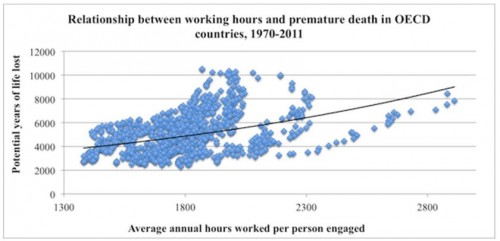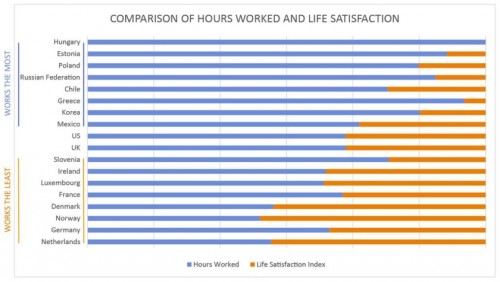On average, U.S. workers with jobs put in more hours per year than workers in most OECD countries. In 2012, only Greece, Hungary, Israel, Korea, and Turkey recorded a longer work year per employed person.
A long work year is nothing to celebrate. The following chart, from the same Economist article, shows there is a strong negative correlation between yearly hours worked and hourly productivity.
More importantly, the greater the number of hours worked per year, the greater the likelihood of premature death and poor quality of life. This reality is highlighted in the following two charts taken from an article by Angus Chen titled “8 Charts to Show Your Boss to Prove That You Can Do More By Working Less.”
In sum, we need to pay far more attention to the organization and distribution of work, not to mention its remuneration and purpose, than we currently do.
Martin Hart-Landsberg is a professor of economics at Lewis and Clark College. You can follow him at Reports from the Economic Front.




Comments 10
Bill R — April 9, 2014
A few comments...
Unfortunately, many people don't like their jobs or just don't like to work. I'm lucky not to suffer that fate and 2,000 hours a year seems more than reasonable to me. I'm not talking about hard physical labor here BTW.
I also have to laugh at Greece and Turkey coming in at longer work hours. Let me guess: self-reported data?
God forbid legislators in this country starts passing more laws to limit the workweek!
Bottom line: Position yourself early in life through education and discipline to get a job you love to do, and you won't have to worry about doing it too much.
midorime — April 9, 2014
"Bottom line: Position yourself early in life through education and discipline to get a job you love to do, and you won't have to worry about doing it too much."
I used to say the same thing. Then I thought about it. Most jobs that keep the world going are not particularly (or even remotely) enjoyable. So a small percentage of people will have the combination of circumstances (luck) and drive (competitiveness) to get the enjoyable jobs, and the vast majority will be stuck with jobs that make them largely miserable. To turn around and say that because a relatively few people have the chance to be happy, we don't need to concern ourselves with the well-being of most people ("had their chance, didn't cut it") is one way of looking at the world. It's just a rather selfish one.
The Grand Narrative — April 12, 2014
Without disputing that there is a strong negative correlation between yearly hours worked and hourly productivity, it's important to remember that that's not necessarily simply because tired workers tend to be unproductive; rather, many of those hours at the workplace may not be spent working at all. In the case of Korea, frequently cited as having the longest working hours in the world, it is common practice to stay until the boss leaves, regardless of if there is any actual work to do. This means people will spend hours texting, playing computer games, or even *sleeping* at the office in the afternoons, before (visibly) hunkering down towards the evening. As described here -- http://www.businesskorea.co.kr/article/3698/insider-perspective-seven-reasons-why-korea-has-worst-productivity-oecd --it's all about looking busy:
"In business or social situations both, Koreans have a penchant for giving
off the impression of being busy. Rarely will you meet a Korean that
will say they have relaxed recently. Being busy is the desired state and
worn as a badge of honor.
This leads to Korean workers staying late, much later than any of
their OECD counterparts, to give the impression of being busy.
Unfortunately, staying late at the office does not equate into greater
productivity, and although Korean work colleagues will claim to be very
busy at work, the reality is that most are over-exaggerating their
workload, which brings Parkinson’s law of time into effect.
Parkinson’s law is the adage which states that “work expands so as to
fill the time available for its completion.” The Korean workforce all
know that they will be expected to work overtime hours whether they have
work or not - it’s again another test of perception, loyalty, and
social pressure. So what naturally occurs is the application of
Parkinson’s law. Why finish your work by 5 o’clock when you know you
will be at the office until 10 or 11 anyways? "
OVERWORK AND ITS COSTS: THE U.S. IN INTERNATIONAL PERSPECTIVE | Welcome to the Doctor's Office — April 16, 2014
[…] by Martin Hart-Landsberg, PhD from SocImages […]
Overwork and Its Costs | Foreign Holidays — April 17, 2014
[…] this article discusses how this overwork correlates to a detriment in productivity, life satisfaction, and even correlates to a higher percentage of […]
Links am Sonntag – 27. April | .- — April 27, 2014
[…] Overwork And Its Costs: The U.S. in International Perspective: “In sum, we need to pay far more attention to the organization and distribution of work, not to mention its remuneration and purpose, than we currently do.” […]
Retirement Secrets to Improve Health and Happiness | Signature Wealth — January 24, 2024
[…] Insufficient work-life balance also damages American productivity. Research reveals productivity decreases as hours worked increase. Australia, Switzerland, and Sweden (with less than 40 hour work weeks) rank in the top five most productive countries. The U.S. comes in eighth (while landing at number five on the list of countries with the most hours worked per year). […]